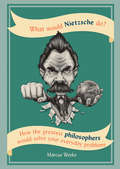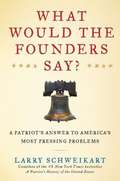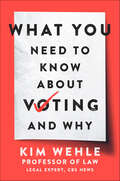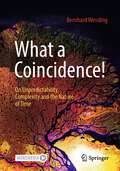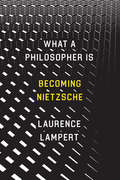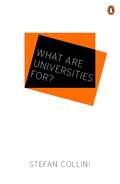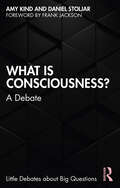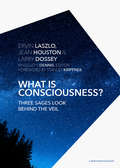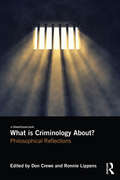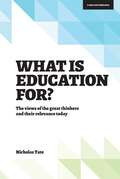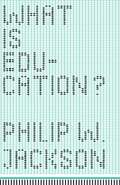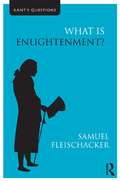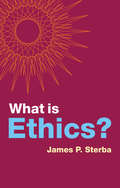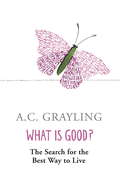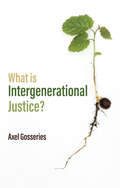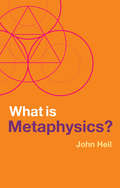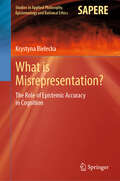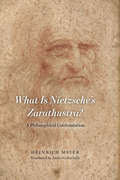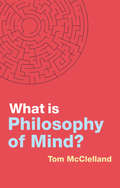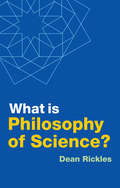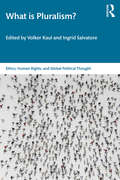- Table View
- List View
What Would Nietzsche Do?: How the greatest philosophers would solve your everyday problems (What Would Ser.)
by Marcus WeeksLet the greatest minds of every generation advise you on the everyday problems in your life.
What Would Nietzsche Do?: Philosophical Solutions To Everyday Problems
by Marcus WeeksEver wondered if Schopenhauer could fix your broken heart? How Heraclitus might help you if you lost your phone? Given the chance, would Foucault leave the toilet seat up?With sections on Relationships, Self and Identity, How to Live, Art and Aesthetics, and Politics, there is an answer to each of modern life's questions here. Each section is comprised of a collection of questions, from 'Is Shakespeare better than the Simpsons?' to 'Should I get a takeaway tonight?'; from little niggling questions, to the great mysteries of human existence. With Marcus Weeks's illuminating commentary on each philosopher's answer to the question at hand, you'll be spouting Socrates and discussing Descartes before you know it. A guide to life, of sorts, and also a fantastic introduction to philosophy for anyone looking to broaden their knowledge of the subject.
What Would Socrates Do?
by Joel Alden Schlosser"Socrates continues to be an extremely influential force to this day; his work is featured prominently in the work of contemporary thinkers ranging from Hannah Arendt and Leo Strauss, to Michel Foucault and Jacques Rancière. Intervening in this discussion, What Would Socrates Do? reconstructs Socrates' philosophy in ancient Athens to show its promise of empowering citizens and non-citizens alike. By drawing them into collective practices of dialogue and reflection, philosophy can help people to become thinking, acting beings more capable of fully realizing the promises of political life. At the same time, however, Joel Alden Schlosser shows how these practices' commitment to interrogation keeps philosophy at a distance from the democratic status quo, creating a dissonance with conventional forms of politics that opens space for new forms of participation and critical contestation of extant ones"--
What Would the Founders Say?
by Larry SchweikartThe #1 New York Times bestselling coauthor of A Patriot's History of the United States examines ten current challenges. America is at a crossroads. We face two options: continue our descent toward big government, higher taxes, less individual liberty, and more debt or pull our country back on the path our Founding Fathers planned for us. But that path isn't always so easy to see. Following the success of his previous books, conservative historian Larry Schweikart tackles some of the key issues confronting our nation today: education, government bailouts, gun control, health care, the environment, and more. For each he asks, "What would the founders say?" and sets out to explore our history and offer wisdom to help us get back on track. What would really be compatible with the vision that Washington, Jefferson, Madison, and the other founders had for America? Written in Schweikart's informal yet informative style, What Would the Founders Say? is sure to delight his fans and anyone looking for a little clarity on tough issues.
What You Need to Know About Voting—and Why (Legal Expert Series)
by Kim Wehle“Now, more than ever, Americans are realizing that their votes count. Kim Wehle’s excellent guide tells you everything you need to know about the laws governing our greatest right and privilege. A must-read, especially in an election year.” —Norah O'Donnell, Anchor and Managing Editor, CBS Evening NewsWant to change the world? The first step is to exercise your right to vote! In this step by step guide, you can learn everything you need to know. In What You Need to Know About Voting—and Why, law professor and constitutional scholar Kimberly Wehle offers practical, useful advice on the mechanics of voting and an enlightening survey of its history and future. What is a primary?How does the electoral college work?Who gets to cast a ballot and why?How do mail-in ballots work?How do I register?For new voters, would-be voters, young people and all of us looking ahead to the next election, What You Need to Know About Voting—and Why is a timely and informative guide, providing the background you need in order to make informed choices that will shape our shared destiny for decades to come.
What a Coincidence!: On Unpredictability, Complexity and the Nature of Time
by Bernhard WesslingHow does chance enter our world? And why is so much not predictable?In an understandable, exciting and amusing narrative, the author takes us into the world of chemistry, quantum physics and biology. Touching on astronomy and philosophy, we witness a rewarding journey of discovery. In the process, he develops a completely new view of chance based on the laws of nature. Here, the omnipresent non-equilibrium plays an extremely decisive role, because it generates the complex structures in our world. Finally, on this basis, he presents an equally simple and captivating hypothesis on the nature of time.This non-fiction book provides a deep insight into the fascination of research, the agonizing search for fundamental understanding, and the struggle for scientific knowledge.
What a Philosopher Is: Becoming Nietzsche
by Laurence LampertThe trajectory of Friedrich Nietzsche’s thought has long presented a difficulty for the study of his philosophy. How did the young Nietzsche—classicist and ardent advocate of Wagner’s cultural renewal—become the philosopher of Will to Power and the Eternal Return? With this book, Laurence Lampert answers that question. He does so through his trademark technique of close readings of key works in Nietzsche’s journey to philosophy: The Birth of Tragedy, Schopenhauer as Educator, Richard Wagner in Bayreuth, Human All Too Human, and “Sanctus Januarius,” the final book of the 1882 Gay Science. Relying partly on how Nietzsche himself characterized his books in his many autobiographical guides to the trajectory of his thought, Lampert sets each in the context of Nietzsche’s writings as a whole, and looks at how they individually treat the question of what a philosopher is. Indispensable to his conclusions are the workbooks in which Nietzsche first recorded his advances, especially the 1881 workbook which shows him gradually gaining insights into the two foundations of his mature thinking. The result is the most complete picture we’ve had yet of the philosopher’s development, one that gives us a Promethean Nietzsche, gaining knowledge even as he was expanding his thought to create new worlds.
What are Universities For?
by Stefan ColliniAcross the world, universities are more numerous than they have ever been, yet at the same time there is unprecedented confusion about their purpose and scepticism about their value. What Are Universities For? offers a spirited and compelling argument for completely rethinking the way we see our universities, and why we need them. Stefan Collini challenges the common claim that universities need to show that they help to make money in order to justify getting more money. Instead, he argues that we must reflect on the different types of institution and the distinctive roles they play. In particular we must recognize that attempting to extend human understanding, which is at the heart of disciplined intellectual enquiry, can never be wholly harnessed to immediate social purposes - particularly in the case of the humanities, which both attract and puzzle many people and are therefore the most difficult subjects to justify.At a time when the future of higher education lies in the balance, What Are Universities For? offers all of us a better, deeper and more enlightened understanding of why universities matter, to everyone.
What is Consciousness?: A Debate (Little Debates about Big Questions)
by Daniel Stoljar Amy KindWhat is consciousness and why is it so philosophically and scientifically puzzling? For many years philosophers approached this question assuming a standard physicalist framework on which consciousness can be explained by contemporary physics, biology, neuroscience, and cognitive science. This book is a debate between two philosophers who are united in their rejection of this kind of "standard" physicalism—but who differ sharply in what lesson to draw from this. Amy Kind defends dualism 2.0, a thoroughly modern version of dualism (the theory that there are two fundamentally different kinds of things in the world: those that are physical and those that are mental) decoupled from any religious or non-scientific connotations. Daniel Stoljar defends non-standard physicalism, a kind of physicalism different from both the standard version and dualism 2.0. The book presents a cutting-edge assessment of the philosophy of consciousness and provides a glimpse at what the future study of this area might bring. Key Features Outlines the different things people mean by "consciousness" and provides an account of what consciousness is. Reviews the key arguments for thinking that consciousness is incompatible with physicalism. Explores and provides a defense of contrasting responses to those arguments, with a special focus on responses that reject the standard physicalist framework. Provides an account of the basic aims of the science of consciousness. Written in a lively and accessibly style. Includes a comprehensive glossary.
What is Consciousness?: Three Sages Look Behind the Veil
by Stanley Krippner Larry Dossey Jean Houston Ervin LaszloWhat is consciousness? Conventional thinking tells us it is the images, sensations, thoughts, and feelings produced by the brain. When the neurons in the brain stop firing, consciousness ceases to be. But does it?
What is Criminology About?: Philosophical Reflections
by Ronnie Lippens Don CreweSince its inception, criminology has had trouble answering the question of what it is about. But although many consider the answer to this question to be self-evident, this book pursues the provocative possibility that criminology does not know what the object of its study is; it merely knows what it is called. Aiming to foster dissent among those who claim to know what criminology is about – and those who don’t – writers from different schools of thought come together in this collection to answer the question "what is criminology about?" Building on a resurgence of interest in the nature of the object of criminology, their responses aim to deepen, and to expand, the current debate. This book will, then, be of considerable interest to contemporary proponents and students of criminology and law.
What is Education for?: The View of the Great Thinkers and Their Relevance Today
by Nicholas TateDr Nicholas Tate looks at the philosophies of 10 great thinkers from history and explains how their ideas put current education issues into a new perspective, while suggesting additional ones to be addressed. The aim is to show how engaging with interesting past minds can both help put current issues in a new perspective and suggest additional ones to be addressed.
What is Education for?: The View of the Great Thinkers and Their Relevance Today
by Nicholas TateDr Nicholas Tate looks at the philosophies of 10 great thinkers from history and explains how their ideas put current education issues into a new perspective, while suggesting additional ones to be addressed. The aim is to show how engaging with interesting past minds can both help put current issues in a new perspective and suggest additional ones to be addressed.
What is Education?
by Jackson Philip W.One day in 1938, John Dewey addressed a room of professional educators and urged them to take up the task of “finding out just what education is. ” Reading this lecture in the late 1940s, Philip W. Jackson took Dewey’s charge to heart and spent the next sixty years contemplating his words. The stimulating result of a lifetime of thinking about educating, What Is Education? is a profound philosophical exploration of how we transmit knowledge in human society and how we think about accomplishing that vital task. Most contemporary approaches to education follow a strictly empirical track, aiming to discover pragmatic solutions for teachers and school administrators. Jackson argues that we need to learn not just how to improve on current practices but also how to think about what education means—in short, we need to answer Dewey by constantly rethinking education from the ground up. Guiding us through the many facets of Dewey’s comments, Jackson also calls on Hegel, Kant, and Paul Tillich to shed light on how a society does, can, and should transmit truth and knowledge to successive generations. Teasing out the implications in these thinkers’ works ultimately leads Jackson to the conclusion that education is at root a moral enterprise. At a time when schools increasingly serve as a battleground for ideological contests, What Is Education? is a stirring call to refocus our minds on what is for Jackson the fundamental goal of education: making students as well as teachers—and therefore everyone—better people.
What is Enlightenment? (Kant's Questions)
by Samuel Fleischacker"Have the courage to use your own understanding! - that is the motto of enlightenment." - Immanuel Kant The Enlightenment is one of the most important and contested periods in the history of philosophy. The problems it addressed, such as the proper extent of individual freedom and the challenging of tradition, resonate as much today as when they were first debated. Of all philosophers, it is arguably Kant who took such questions most seriously, addressing them above all in his celebrated short essay, An Answer to the Question: What is Enlightenment? In this engaging and lucid book, Samuel Fleischacker first explains and assesses Kant’s philosophy of Enlightenment. He then considers critics of Kant’s views - from Burke and Hegel to Horkheimer and Adorno - and figures he regards as having extended Kant’s notion of enlightenment, such as Feuerbach, Marx, Habermas, Foucault, and Rawls. Throughout, he demonstrates how Kant holds two distinct theories of enlightenment. On the one hand, Kant proposes a ‘minimal’ view, where to be enlightened is simply to engage in critical public discussion, allowing diversity of opinion to flourish. On the other, he argues that Kant elsewhere calls for a ‘maximal’ view of enlightenment, where, for example, an enlightened person cannot believe in a traditional religion. With great skill Fleischacker shows how these two views are taken in a multitude of directions by both critics and advocates of Kant’s philosophy. Arguing that Kant’s minimal enlightenment is a precondition for a healthy proliferation of cultures, religious faiths and political movements, What is Enlightenment? is a fascinating introduction to a key aspect of Kant’s thought and a compelling analysis of philosophical thinking about the Enlightenment. Including helpful chapter summaries and guides to further reading, it is ideal for anyone studying Kant or the philosophy of the Enlightenment, as well as those in related disciplines such as politics, history and religious studies.
What is Ethics? (What is Philosophy?)
by James P. SterbaEthics is a field of study that we all need. This is because we all make choices, and ethics is about the general norms that govern how we should make those choices. Not surprisingly, there is disagreement over what the “norms” are, but by working through such disagreement, we can learn how to make better choices. James P. Sterba presents a general overview of ethics, using relevant examples and accessible arguments. He takes up the question of why we should be ethical or moral, discusses competing ethical theories and proposes a way to reconcile them, and considers the relationship between ethics and religion. Ultimately, he reveals how the material discussed in the book can be used to make better ethical choices in our day-to-day lives. What is Ethics? is a book you can rely on to improve your ability to make ethical choices.
What is Good?: The Search For The Best Way To Live
by A. C. GraylingA.C. Grayling answers the most important question - How do we live a good life?One of the most fundamental questions in our life is to find out what we value - what principles we want to live by and which codes we will use to guide our behaviour. Most of us want to live a good life. But what, in today's secular society, does 'good' actually mean?To classical Greeks, the acquisition of knowledge, the enjoyment of the senses, creativity and beauty were all aspects of life to strive for. Then came the volcanic declarations of St Paul and his fundamentalist ideas on sin and human nature. In WHAT IS GOOD?, A.C. Grayling examines these and other proposals on how to live a good life, from the 'heroic' ideals of the Greek poets to Kant's theories on freedom and the UN Declaration on Human Rights.
What is Good?: The Search for the Best Way to Live
by Prof A.C. GraylingA.C. Grayling answers the most important question - How do we live a good life?One of the most fundamental questions in our life is to find out what we value - what principles we want to live by and which codes we will use to guide our behaviour. Most of us want to live a good life. But what, in today's secular society, does 'good' actually mean?To classical Greeks, the acquisition of knowledge, the enjoyment of the senses, creativity and beauty were all aspects of life to strive for. Then came the volcanic declarations of St Paul and his fundamentalist ideas on sin and human nature. In WHAT IS GOOD?, A.C. Grayling examines these and other proposals on how to live a good life, from the 'heroic' ideals of the Greek poets to Kant's theories on freedom and the UN Declaration on Human Rights.
What is Intergenerational Justice?
by Axel GosseriesCan people alive now have duties to future generations, the unborn millions? If so, what do we owe them? What does “justice” mean in an intergenerational context, both between people who will coexist at some point, and between generations that will never overlap? In this book, Axel Gosseries provides a forensic examination of these issues, comparing and analyzing various views about what we owe our successors. He discusses links between justice and sustainability, and looks at the implications of the fact that our successors’ preferences are heavily influenced by what we will actually leave them and by the education they receive. He also points to how these theoretical considerations apply to real-life issues, ranging from pension reform and Brexit to biodiversity and the climate crisis. He ends by outlining how intergenerational considerations may translate into institutional design. Anyone grappling with the dilemmas of our obligations to the future, from students and scholars to policy makers and active citizens, will find this an invaluable theoretical and practical guide to this moral and political minefield.
What is Metaphysics? (What is Philosophy?)
by John HeilIf we didn't possess certain beliefs about such things as time, appearance and reality, and how effect follows cause, we wouldn't be able to get out of bed in the morning, let alone read a book about metaphysics, which is the study of our experience and those ideas, or presuppositions, which allow us to make sense of it. Drawing on examples from art, science, and daily life, John Heil shows how metaphysics begins in questioning our everyday assumptions about how the world “works” and ends with speculation on the nature of the universe itself. In chapters that cover the major topics in the academic study of metaphysics, from free will and consciousness to time and objectivity, Heil explains how metaphysical questions underpin everything human beings do. This accessible book will show you how professional philosophers try to categorize and make sense of our world of perception and experience and explains why everyone should take metaphysics seriously.
What is Misrepresentation?: The Role of Epistemic Accuracy in Cognition (Studies in Applied Philosophy, Epistemology and Rational Ethics #71)
by Krystyna BieleckaThis book aims to justify and systematize the desiderata that a satisfying philosophical account of mental representations should meet, which is consistent with common-sense practice and scientific research. According to the author, the most important aspect of any satisfactory account of mental representation is the ability to determine that a given representation is incorrect and to identify the nature of the error. The book analyzes selected contemporary theories of mental representations with respect to major desiderata as well as the minor desiderata that they subsume, discussing the requirements for the philosophical accounts of particular types of mental representations. Since none of the previously proposed concepts meet this requirement satisfactorily, the author proposes an alternative theory of misrepresentation, which is based on the idea that epistemic accuracy is what minds care about. According to the author’s findings, cognitive systems rely on complex devices to check for coherence between these representations. In turn, the ideas presented here support the active role of mental representation in practice as an error-checking device in agreement with previous teleosemantics accounts.
What is Nietzsche's Zarathustra?: A Philosophical Confrontation
by Heinrich MeierThus Spoke Zarathustra is Nietzsche’s most famous and most puzzling work, one in which he makes the greatest use of poetry to explore the questions posed by philosophy. But in order to understand the movement of this drama, we must first understand the character of its protagonist: we must ask, What Is Nietzsche’s Zarathustra? Heinrich Meier attempts to penetrate the core of the drama, following as a guiding thread the question of whether Zarathustra is a philosopher or a prophet, or, if he is meant to be both, whether Zarathustra is able to unite philosopher and prophet in himself. Via a close reading that uncovers the book’s hidden structure, Meier develops a highly stimulating and original interpretation of this much discussed but still ill-understood masterwork of German poetic prose. In the process, he carefully overturns long-established canons in the academic discourse of Nietzsche-interpretation. The result is a fresh and surprising grasp of Nietzsche’s well-known teachings of the overman, the will to power, and the eternal return.
What is Philosophy of Mind? (What is Philosophy?)
by Tom McClellandWe all have minds, but what exactly is a mind? Is your mind the same thing as your brain? How does what’s happening in your mind cause your behaviour? Can you know what’s going on in other people’s minds? Can you even be sure what’s going on in your own? Are babies conscious? How about cats? Or self-driving cars? Philosophy of mind grapples with questions like these, exploring who we are and how we fit into the world. In this student-friendly guide, McClelland introduces the key ideas in philosophy of mind, showing why they matter and how philosophers have tried to answer them. He covers the major historical moments in philosophy of mind, from Descartes and his troubles with immaterial souls up to today’s ‘consciousness wars’. Additionally, he examines the implications that philosophy of mind has for psychology, artificial intelligence and even particle physics. McClelland lays out the centuries-long dialogue between philosophy and science, presenting a uniquely grounded, practical picture of the field for students. Rich with real-world examples and written for the absolute beginner, What is Philosophy of Mind? gives students the tools to delve deeper into this dynamic field of philosophy.
What is Philosophy of Science? (What is Philosophy?)
by Dean RicklesPhilosophy of science puts science itself under the microscope: What exactly is science? How do its explanations of the world differ from those of other subjects, including so-called “pseudo-sciences”? How should we understand and evaluate scientific methods? What, if anything, can science tell us about the nature of physical reality?Dean Rickles guides beginners through the central topics in philosophy of science. He looks at the origins and evolution of the field, the issues that arise when distinguishing between science and non-science, the concepts of logic and associated problems, scientific realism and anti-realism, and the nature of scientific models and representing. Rickles brings the subject to sparkling life with a user-friendly tone and rich, real-world examples.What is Philosophy of Science? is the must-have primer for students getting to grips with this broad-ranging and important topic.
What is Pluralism? (Ethics, Human Rights and Global Political Thought)
by Volker Kaul Ingrid SalvatoreIs pluralism inherent to the human condition? Does it have its origins in the diversity of cultures? Are disagreements among individuals the same as disagreements among societies? Focusing on these critical questions essential to the understanding of modern societies, this book traces the origins of pluralism in contemporary political thought and presents new, original interpretations of the idea by contemporary philosophers. The chapters in the volume bring clarity into an ongoing fractious debate and reveal the underlying roots and fissures in our understanding of a dynamic and contested idea. Drawing on the works of John Rawls, Jürgen Habermas, and other major political philosophers, they delve into the different strands of the concept, their possible real-world political outcomes, and popular misconceptions. A key text, this volume will be essential reading for scholars and researchers of politics, political theory and philosophy, and social theory.
